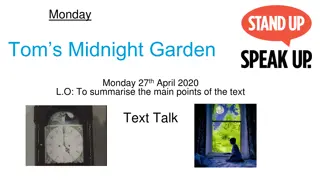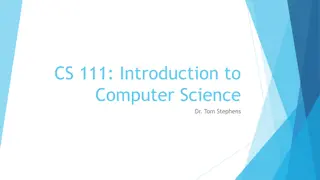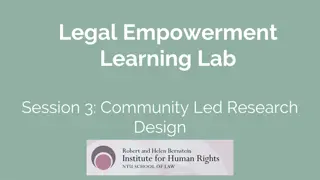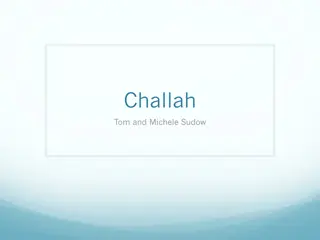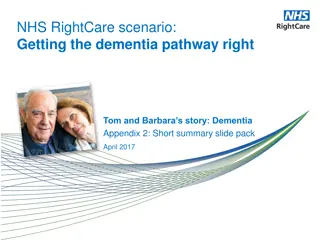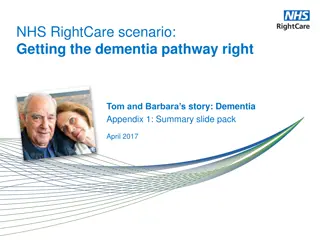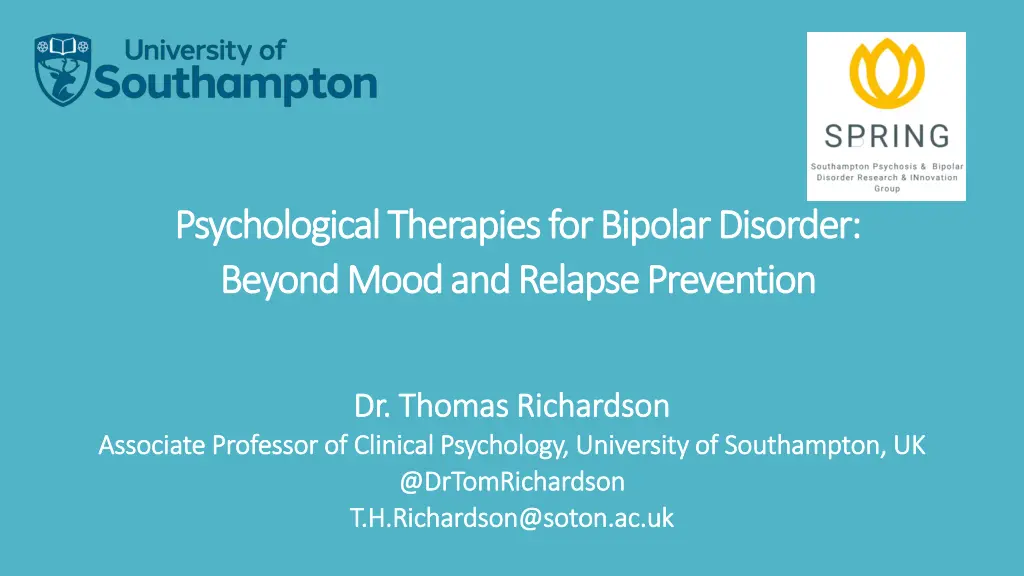
Psychological Therapies for Bipolar Disorder: Beyond Mood and Relapse Prevention
Explore the effectiveness of psychological therapies like CBT and family therapy for bipolar disorder management. Learn about common therapy components, evidence supporting psychoeducation, and the challenges faced by individuals with bipolar disorder.
Download Presentation

Please find below an Image/Link to download the presentation.
The content on the website is provided AS IS for your information and personal use only. It may not be sold, licensed, or shared on other websites without obtaining consent from the author. If you encounter any issues during the download, it is possible that the publisher has removed the file from their server.
You are allowed to download the files provided on this website for personal or commercial use, subject to the condition that they are used lawfully. All files are the property of their respective owners.
The content on the website is provided AS IS for your information and personal use only. It may not be sold, licensed, or shared on other websites without obtaining consent from the author.
E N D
Presentation Transcript
Psychological Therapies for Bipolar Disorder: Psychological Therapies for Bipolar Disorder: Beyond Mood and Relapse Prevention Beyond Mood and Relapse Prevention Dr. Thomas Richardson Dr. Thomas Richardson Associate Professor of Clinical Psychology, University of Southampton, UK Associate Professor of Clinical Psychology, University of Southampton, UK @DrTomRichardson @DrTomRichardson T.H.Richardson@soton.ac.uk T.H.Richardson@soton.ac.uk
Conflict of Interest Statement I have been paid to deliver training on CBT for Bipolar Disorder. I will receive royalties from a book on psychological therapies for Bipolar Disorder.
Bipolar and Psychological Therapies: Evidence Miklowitz et al. (2021): Meta-analysis of 39 RCTs showed psychoeducation delivered via family therapy or a in a group setting reduced the risk of relapse: 50% reduction in relapse for therapy + medication (compared to medication alone). Group or family interventions better at reducing relapse risk. CBT, family therapy and interpersonal therapy reduce depression symptom severity. Improves for manic symptom severity.
Overview: Common therapy components Psychoeducation Identify triggers Identify early warning signs Behavioural strategies Mood monitoring Thought identifying and challenging Relapse prevention plan Behavioural activation for acute symptoms Challenge cognitive vulnerability: Dysfunctional assumptions, perfectionism.
Bipolar and other problems High risk of childhood abuse (4 fold risk emotional abuse). Up to 75% have comorbid anxiety disorder. Up to 42% have substance use issues: Esp. alcohol and cannabis. Up to 25% PTSD 3/4 of those with Bipolar 1 have experienced psychosis. Impact of (hypo)manic episodes: Vast majority report impulsive spending and hypersexuality. Financial problems (50% bankrupt or considered bankruptcy). Relationship problems: High divorce rates Employment problems. Many people enjoy parts of hypomania/mania
Going deeper than the surface level Relapse prevention Relapse prevention Current mood, Current mood, behaviour & thinking behaviour & thinking Anxiety Anxiety Trauma Trauma Recovery Recovery Quality of life Quality of life Shame Shame Self Self- -criticism criticism High standards High standards Positive beliefs Positive beliefs Impulsivity Impulsivity
Patients' goals for treatment are diverse and often focus on functional recovery (e.g., returning to work or improving relationship quality), rather than symptom remission per se. Personalizing treatment plans and therapy delivery using individualized formulation and patient goals alongside bipolar-specific treatment targets is likely to yield the best outcomes . Suggest more research on Bipolar sub-populations e.g. stage, diagnosis, comorbidity. Recommend focus on mechanisms of action and causal pathways.
Today We know psychological therapies work for Bipolar Disorder on acute mood and episodes. Today we will look at emerging evidence on using therapies to go deeper and beyond relapse prevention alone. Steven Jones: Personal Recovery in Bipolar: New Developments in Theory and Therapy. Martin D. Provencher: Treating Anxiety Disorders and Symptoms Comorbid with Bipolar Disorders Using Psychological interventions: State of the Evidence. Jan Freeman: Exploring the feasibility and acceptability of a Cognitive Behavioural Therapy (CBT) protocol for mood-driven, problematic impulsive behaviours in adults with bipolar disorder: A case Series.
Book on Psychological Therapies ready for pre Book on Psychological Therapies ready for pre- -order: order:





